Text
"Stick it?!"
"In my bottom, presumably"
... I mean, this line in the context of Carpe Diem, mamma mia! (ABBA)
#bbc ghosts#the captain ghosts#ghosts bbc#bbc ghosts series 5 spoilers#the captain's sexuality#bbc ghosts series 5#bbc ghosts s5#bbc ghosts spoilers#silly posts
32 notes
·
View notes
Text
The empty frame (which also became an incidental meta about portraits in Ghosts)
I find the establishing shot of the Captain reminiscing privately in Carpe Diem very meaningful.
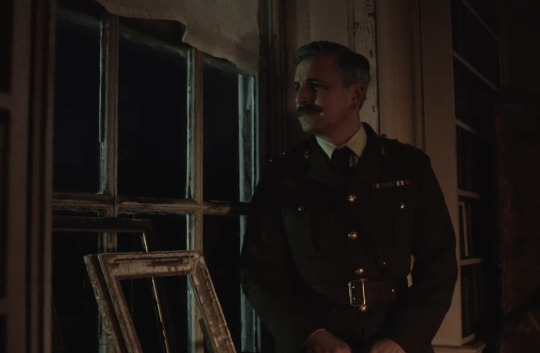
We get this image with the music they used in Redding Weddy to introduce the flashbacks between the Captain and Havers. Interestingly, in that episode, we hear the violins twice and it's always in association with the letter addressed to William – the first time, the Captain is looking at the envelope in deep thoughts and hurriedly hides it as he bids Havers to come; the second, he looks at the envelope in deep thoughts and eventually throws it on top of the bomb (his metaphorical heart), intending to bury them forever (... or until it explodes, as it were. Of course, if you repress your feelings for too long, they tend to explode in your face).
When you hear the music, you immediately understand the Captain is thinking about Havers.
The framing (pun intended) is really interesting to me. The Captain has an expression of intense longing on his face. He seems to be in the same position as he was at the end of Redding Weddy, when he sees/remembers Havers' private goodbye from afar as he left for the front; sitting at the same window; turned the same way; a similar expression on his face; both hands on the stick again. Indeed, just after, we are shown the same view of the front gate, sans Havers. If you allow me another nod: the frame is empty.
I keep talking about frames, because I find the empty frame on the Captain's right very symbolic. The association with the next shot (the image of the front gate without Havers = an empty frame) makes it all the more poignant to me. Why is the Captain's frame empty?
Frames are shown to ornate several kinds of objects in the show:
Portraits of loved ones. Fanny's husband comes to mind. Interestingly, it is the portrait of a closeted homosexual man, whom Fanny eventually learns to accept for who he was and what society was through his portrait (while a gay wedding is about to take place).
Portraits of oneself. Humphrey and Fanny are prominent ones. I just realised that both portraits get torn during the show, which reflects their fragmented identities/sense of self. I love that Fanny's portrait gets repaired, albeit not perfectly, by Alison. I love that Fanny recognises that she is still the same girl underneath. (I love that Humphrey seems mildly disgruntled and resigned at the damage on his one? It's exactly his reactions towards his recalcitrant body, and it feels very much like his whole vibe; I adore him). Also, we shouldn't forget Thomas' portrait: slowly built until he overthinks it all, gets ahead of himself and rejects the piece before it is ready... a portrait which ends up being put aside by the woman he loves (a woman who feels slighted by his hasty words even if he only wanted to be honourable). If it doesn't parallel his relationship with Isabelle and his death, I don't know what does!
Mirrors. It is a recurring theme around the Captain of course: we see his reflection in the mirror in the intro; the picture on Alison's mirror has him reminiscing about dead seagulls and start the process of resolution which saves the day.
With that in mind, I find the symbol of the empty frame can work on several layers here:
Portrait of a loved one: the frame is empty, but not because there is no one (there is still a frame). It could symbolise an absent lover (Havers left the picture through that front gate)... or a love that never became official. No one could have taken Havers' portrait for the Captain. And Havers wouldn't have given him his picture, because everything was left unsaid. Not to mention the fact that it would have been incredibly damning and dangerous for the Captain to keep the image of the man he loved around him. It had to stay hidden, invisible. So no picture, and Havers is far away and out of reach, but he is still very much present in the Captain's mind and heart. He is able access the memory of Havers not through his portrait but through his secret memories.
Portrait of oneself: a portrait (one like Fanny's, Humphrey's and Thomas') is made with care. It takes a long time to complete and it cements the way you want to (or people want you to) be remembered through time. It is a reflection of who you are, but also the way others perceive you. Humphrey and Fanny had their portraits done because they were socially important and rich people; these are very official portraits. As I touched before, they are also a sign of their fragmented selves. Both characters want to be and get to be more than this unmoving piece of history. They both lost themselves in who they were supposed to be. Through death, they are allowed to show their own individuality. For his part, Thomas gets to pose like a romantic intellectual (or an intellectual romantic?), very much the way he wants to be seen and remembered. He has someone close to him who is willing to paint him.
Now, the empty frame could be a sign that the Captain was not considered important enough in his life or was not remembered fondly enough (by the troops, for example) to capture his image. We understand that he has never been on the front, and men like Cartwright sneer at him for that reason. In a room full of officers, the heroes whose memory the Captain never fails to honour, he is readily rejected. At that point in time, there is no place in history for the Captain to be remembered (and he believes it too: "I am no hero"). The empty frame could be a symbol of his lack of active role during the war (something that is obviously important in his own identity and the way he is perceived by people who "made history"). The absence of a portrait could also reflect the fact that no close one was there to take his picture. He was not fully seen by Havers, or, once again, it was not possible for them to carry a portrait of their loved one. It was even less possible for Havers to take the time to paint the Captain or be asked to take his picture (… although... one could dream. I mean, can you imagine Havers secretly, or not-so-secretly-but-the-Captain-is-oblivious, taking a picture of him, developing it on his own and frequently gazing at the portrait of the Captain, so focused on his image that he fails to see the seemingly judgemental old lady looking over the Cap's shoulder in the background. I love the idea of Fanny & James, the repressed siblings, having a photo taken of them together before they even got to know each other). To sum up: no official loved one to preserve the Captain's image, no place in history according to his society.
Mirrors: well, it's all about the reflection of the self, isn't it? We know the Captain has difficulties with his identity. He has carefully crafted his military persona and has played the role of the strict and efficient commanding officer for decades, repressing his more sentimental and less conventional side as much as he could. A crucial part of his arc is that he buried his heart and he has to learn to accept himself and express who he is without fear. I also love the idea of inversion in relation to the Captain: in a mirror, you're looking at the inverted image of yourself. "Inversion" was a synonym for homosexuality in the Victorian era (and was still in use in the 40s). Therefore, the recurring theme of mirrors makes a lot of sense around this character. Even his decorations (over his heart) are placed in an inverted way. The empty frame could represent the lingering issue around his identity. After this moment of introspection, and faced with his potentially impeding passing, he will finally tell the truth about who he is. The frame is empty right now, but he is about to leave that behind: he gets to accept who he is. He gets to share the truth about his past and his heart. He gets to be seen (and cherished) for who he is.
The Captain is gazing out of the window, but visually the empty frame is very much part of that window. Hence the Captain is metaphorically reflecting on this empty frame. A symbol for the absence of his loved one, the lack of place in history or remembrance for him, the lack of place in history and memories for his relationship with Havers, the sense of intense self-repression. (on that note, bear in mind that up until his confession, no one knew the Captain's name. It is after this deep introspection that James is able to be open about it all)

When he comes out of his reflection (... pun intended?), we can see how intense the process is for him. It is overwhelming and painful. But when he looks away from the window/empty frame, he faces forward. He turns his eyes to the room next to him - I believe it is the room where he's about to meet the ghosts, so the room where he's about to come out. This shift means that in the Captain's mind, it is not about then anymore: it is about now. Back then he couldn't be himself; he couldn't show his heart. Now, if he's brave enough, maybe he can exist as his true self.
#bbc ghosts#bbc ghosts meta#the captain ghosts#the captain#ghosts bbc#bbc ghosts series 5 spoilers#bbc ghosts series 5#bbc ghosts spoilers#ghosts spoilers#ghosts meta#the captain's name#carpe diem#the captain and havers#capvers
151 notes
·
View notes
Text
Beautiful parallels between Redding Weddy and Carpe Diem
Thanks to the headcanon @memoryallaloneinthemoonlight shared on this post, I was thinking about the Captain potentially hiding a love letter (his true feelings, his true nature) inside a military decoy (Operation William) and how it was being reminiscent of him hiding behind his military persona... It got my mind reeling at the associations between his almost-death-but-not-quite in Redding Weddy and his real death.
The symbol of the bomb (his explosive "dangerous" feelings) threatening to explode and kill his loved ones and the Captain rushing to sacrifice himself to protect them is a very interesting parallel to his death. In Carpe Diem, the Captain is (wedding) ready to unearth his buried feelings, an outside party (bloody Cartwright...) digs around and is close to finding the truth. It all blows up in the Captain's face. He literally dies from it. And yet, in this brave and risky endeavour, he gets recognition, acceptance and tenderness from his loved one. He shares a deeply meaningful final goodbye with Havers.
I think it parallels Redding Weddy beautifully. There, he heavily implies the suggestive nature of his "explosive" secret to Alison, an outside party digs around and it's about to explode in everyone's face: the "shocking" nature of the Captain's feelings is a potential death threat to his loved ones (and himself). In a heroic move, he hurries to bodily throw himself onto the letter/bomb to save everyone.
The difference is that, yes it blow up in his face... but this time he doesn't die. He is not surrounded by hatred and disgust; there are only the ghosts' looks of concern and Fanny relieved sigh when she realises he is safe. In a way, couldn't we say that her emotional "Captain..." mirrors Havers' "James..."? This indicates a change of context: the world is ready for him (Alison's gentle encouragements every time she understands, the upcoming gay wedding which will take place in the room where he died suffocated by homophobia), even if he doesn't full understand it yet. He is getting more and more ready to fully accept himself and open up as well. His secret will not kill or ruin anyone. In the aftermath, like in Carpe Diem, he gets recognition, acceptance and tenderness from a loved one (Alison's "here's to buried secrets"). In a way, here too, he gets to see/remember Havers in an emotional private final goodbye.
I personally see a parallel between the Captain rushing to meet Havers (the object of his affection, the recipient of the potential buried love letter) in Carpe Diem and him rushing towards the bomb/letter (the object of his affection, as in encasing his affection). In both cases, he shows extraordinary bravery. Both actions are also a proof of deep love and affection. Both stem from a desire to make sure his loved ones are safe (he needs to see that Havers is safe after the war; he needs to protect Mike and Alison).
I also believe he doesn't think too much about the consequences of his actions when he launches himself into it. It is evident to me that the Captain and Havers initially forget all about their surroundings when their eyes meet. In Redding Weddy, the Captain's line after the explosion says it all: "Now, I realise it was a utterly futile gesture, but I was very much caught up in the moment". I think this sentence could apply to his actions in Carpe Diem as well... not that the intentions behind them are futile: making sure Havers is alright and longing to talk to him are wonderfully important matters (like protecting your found family). However, the series of actions which put him in a very dangerous situation might have been prevented (he could have signalled to Havers to meet him in a more secluded room when their eyes met, for example). It is very romantic and very much like the Captain that he got caught in the moment and rushed towards Havers without thinking. The man tends to get flustered and forget himself when he's confronted to an object of interest/desire (whether it is military-oriented, romantic or both, which is definitely the case in Redding Weddy and Carpe Diem).
It is interesting how both scenes cement (perhaps change, too?) our perception of the character. We get to discover the character as a loving man, on the verge of declaring his feelings for Havers. Both times, Havers knows what is left unsaid and accepts it. The almost-declarations take place in a tragic moment (Havers is about to leave and may die on the front; the Captain is about to die). I loved to see the evolution of the Captain's openness when he was alive, because you cannot convince me that he wouldn't have told Havers had they been alone. He couldn't bring himself to in Redding Weddy, but he was ready in Carpe Diem (even if it were a sign he was caught up in the moment, that counts).
Similarly, in both scenes, we get to see the Captain as a full-on hero, even if we knew him as this nervous and slightly useless character. Actually, both times, we see him getting mocked and belittled by other members of the troops and still pull off a heroic action. I absolutely believe that when the Captain threw himself on the bomb, he had forgotten he was not alive. He would have jumped regardless to protect others. Getting in a den full of men who were in a combat zone when you are very much not welcome just to see if the man you love is okay and trying to find a way to convey your feelings for him in front of a lot of people (whom the Captain considers to be heroes... and who, he knows, would be horrified by the nature of his heart), in a way that would keep Havers safe, that is absolutely heroic to me.
I love how well-crafted the show is... There are so many treasures to see and dig into. So many emotions... The more you think about it, the more beautiful it becomes.
#bbc ghosts#bbc ghosts meta#the captain#the captain ghosts#ghosts bbc#bbc ghosts series 5 spoilers#bbc ghosts series 5#bbc ghosts spoilers#ghosts spoilers#bbc ghosts s5#captain x havers#havers#lieutenant havers#carpe diem#redding weddy#the captain and havers#capvers#found family
44 notes
·
View notes
Text
Oh yes, I love it!! It feels very much like the Captain, hiding a love letter (his true feelings, his true nature) inside a decoy (a military facade). He is a man who has been hiding his true self and his emotions behind a carefully-constructed military persona, to the point that at first glance, everything you might perceive of him is "army man (nothing to see here, thank you)". But if you dig deeper (wink wink), the pool of feelings and sentimentality is not buried very far.
(It's inspiring me a whole meta about the parallels between Redding Weddy and Carpe Diem; so many beautiful things to see!!)
I just watched episode 5 and I'm just like... "who the hell was William?!!!" xD Why did they use that name??
I mean I know the Captain says William was the name of the operation... but still, there was something very emotional around that letter and the way it was filmed. Of course, I get that it was a metaphor. But a part of my brain cannot stop thinking about this William, like was the full name Anthony William Havers?? Did - did the Captain have a dog called William at one point (he fibs about having his dog buried there)? Is it his full name, James William Something? Am I missing something very obvious?
Am I torturing myself for an irrelevant detail? I know the answer to that one! Bloody William!
#bbc ghosts#ghosts bbc#bbc ghosts series 5 spoilers#bbc ghosts spoilers#bbc ghosts meta#bbc ghosts s5#the captain ghosts#the captain and havers#the captain#william havers#carpe diem#redding weddy#bbc ghosts series 5
35 notes
·
View notes
Text
I just watched episode 5 and I'm just like... "who the hell was William?!!!" xD Why did they use that name??
I mean I know the Captain says William was the name of the operation... but still, there was something very emotional around that letter and the way it was filmed. Of course, I get that it was a metaphor. But a part of my brain cannot stop thinking about this William, like was the full name Anthony William Havers?? Did - did the Captain have a dog called William at one point (he fibs about having his dog buried there)? Is it his full name, James William Something? Am I missing something very obvious?
Am I torturing myself for an irrelevant detail? I know the answer to that one! Bloody William!
#bbc ghosts#ghosts bbc#the captain ghosts#the captain#the captain and havers#william havers#bbc ghosts series 5 spoilers#bbc ghosts series 5#bbc ghosts spoilers#bbc ghosts s5#redding weddy#carpe diem
35 notes
·
View notes
Text
Oh, I love how you detailed the whole journey of Havers' expressions! That scene, my goodness! It is so rich and full of subtlety, so tragically beautiful... (also: screw you, Cartwright)
I personally interpret their expressions and the dynamic of the scene a bit differently (I think yours is very much valid! I guess I like to suffer on different aspects ^^).
To me, the succession of Havers' moves is indicative of a need for secrecy. When he sees his Captain, he is absolutely elated! Their eyes meet; time stops. He didn't expect to see him here and now, as the Captain was not supposed to be there... but the man is here, he's safe, and he has found a way to reach him. He's even walking towards him right now; they're about to talk! After all these years, after all the things left unsaid... after all the tragedy and loss of the war. Can you imagine the level of emotions?!
When they move towards each other, I am sure that both men have completely forgotten everything and everyone around them. They just want to face each other and reconnect; their minds are full of possibilities, of words they want to say, feelings they want to express. There is no room to think about prying eyes and unfriendly faces.
Additionally, in this moment, they are equals. It doesn't matter to Havers that the Captain has "no legitimacy" to be here; he doesn't care about what he was doing during the war. He's just basking in the fact that he is here. It is fair to say that they both have tremendous admiration and respect for each other.
When they move, they are both eager, giddy, free... and they are not paying attention to the outside world.
... The outside world that immediately steps in and prevents the reunion.
I mean, Cartwright literally cockblocks the whole thing. He bumps into the Captain (who apologises, which, interestingly, Cartwright does not), immediately starts asking a lot of detailed questions and acts very suspicious. The way he words his comments is very loaded as well: "it's not even the right way up", "what are you trying to pull" (replace the "what" with "who"), accusing him of "trying to pass himself off as" something he's not ("a bally hero" = a """real man""", from his perspective, I'm sure).
I very much read Cartwright as a representation of the normative society aggressively stopping and belittling a homosexual person. He "outs" the Captain very harshly and loudly, placing him in a very dangerous position: a sea of faces immediately surrounds him, hateful and judging, ready to fight. Cartwright's message is loud and clear: "I see what you are and you are not like us; you are not welcome here" (which is not true: one person is like him and happy to see him!), ideas which a lot of gay and queer people have been forced to face in society, as well as this feeling of being suffocated by a sea of judgement and hatred. The whole symbolic of the heart attack in the midst of this situation (being prevented from seeing the person you love and from saying the things you need to express, plus the overwhelming feeling of hatred) is evident.
This is for the Captain's perspective... but it's the same for Havers. When he sees Cartwright bumping into the Captain, he knows. He suddenly remembers where he is. All these feelings, this thrill at seeing someone who is not supposed to be here, all these words he longs to say... they are not welcome here. It is dangerous. So the minute Cartwright steps into the scene, Havers reverts back to repressing. In order to protect themselves and each other, they need to hide. That's why Havers is so tense. After this fanciful moment, there is this overwhelming sense of danger looming over both of them.
Moreover, Cartwright was serving at Button House when the Captain was CO. We remember the soldiers' attitude towards the Captain: no one respected him and they were quick to laugh at him. Only Havers showed great respect for the Captain despite (thanks to?) his antics. I believe there is a high chance that Havers heard Cartwright talk about the Captain back then. I am sure Havers often had to intervene to prevent mockery among the troops. Of course he knows that Cartwright would recognise the Captain instantly, and all his former men are probably very aware that he would never survive/dare to go on active duty. When Havers sees Cartwright, he knows the Captain will get outed, he knows he will get thrown out. He's bracing himself for the inevitable to come. He has to repress everything down and look perfectly innocent and part of the group again.
He seems very focused as well, and I like to think that on top of it all, he's already plotting how to meet the Captain outside the house they know so well in a few minutes.
In the midst of all this, I believe it shows the amount of Havers' bravery and deep affection that he lets himself be so open in the sea of all these faces when the Captain is in distress.
I love his harsh and angry tone when he orders Cartwright to call a medic. It very much feels like revenge for the Captain's treatment... but also something deeper, as if he were addressing the heteronormative society: "you did this / go away, this private goodbye is not for you / find a way to heal this".
It is very telling how adamant he is that Cartwright gets out before fully allowing himself to touch the Captain. There are still many eyes on them when he shows his deep tenderness for this man. Was he afraid that Cartwright, who had seen them together for a number of years, would be able to fully connect the dots? Was he aware that he had a particularly strong hatred for the Captain which he would gladly redirect to him?
I truly believe he felt threatened by that man's presence. But also, since Cartwright is a symbol for the aggressive and hateful normative society, it makes a lot of sense that Havers would feel threatened by him at that moment. Despite the threat, however, Havers shows way more anger than fear. He banishes the threat away before turning back to his lover and showing a great deal of care and tenderness.
In the end, in a way, love prevails. They don't share all the words, but they know. They touch. The Captain gets to die while Havers touches his hand; he gets to know that Havers sees him and accepts him and loves him back. He will carry a piece of him forever. Something readily given by Havers and tenderly placed in his hands for him to die with. Ironically, while some people thought the Captain had no place here, he will stay in Button House until he gets sucked off.
Cartwright and the normative society wanted to squash them; years later, the Captain gets to see a gay wedding in that exact same room. He gets to be called brave by people who see him. He gets to open up, bit by bit, to people who know, and they accept him and love him. And through it all he carries the indirect touch and support of Havers.
(don't look at me, I'm bawling)
Okay so I just noticed something and I'm going feral, feral I tell you.
This is going to be a really, really long one with a lot of picures and I'm honestly not sure if I saw something completely obvious that everybody immediately got whilst watching^^° or if I found something here.
Nonetheless strap in in this essay I will...
So in Cap's flashback he enters the room and looks around clearly looking for someone and when he spots Havers he gets this relieved, smitten "omg I found you/you're here and alive" expression in His face
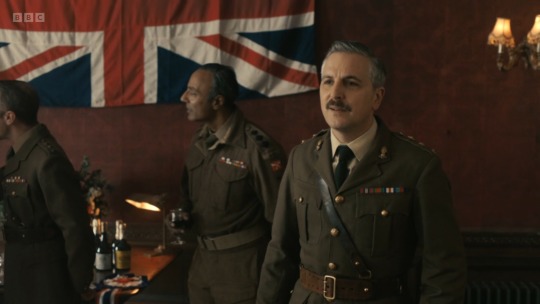
And Havers who spots him out of the corner of his eyes gets all wide eyed
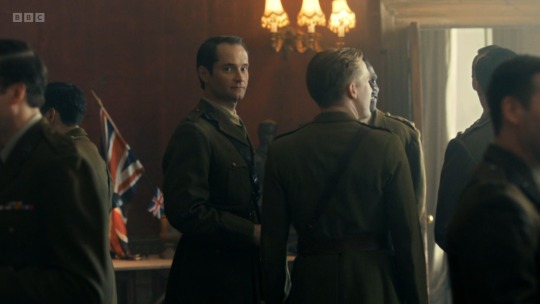
and turns himself towards Cap with this tiny little smile and he looks so fond at him and also as if he's internally screaming (also in an "omg you made it I'm seeing you again" way)
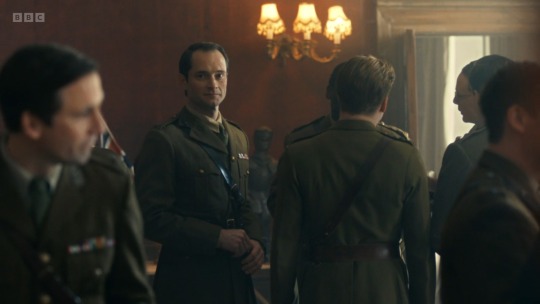
And then Cap walks in his direction but then bumps into Cartwright and they start talking and Cap who seems to be on good terms with him smiles back at Cartwright and seems super happy and giddy (because Havers is alive and in the same room and they will reconnect in a few moments)
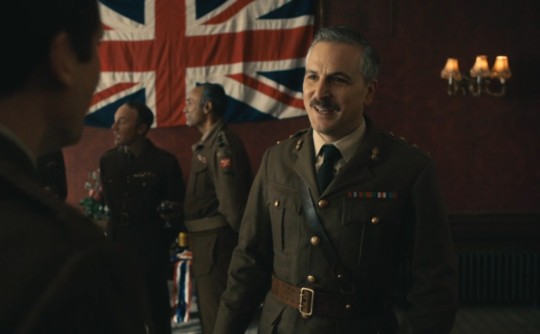
And then Havers watches them like this
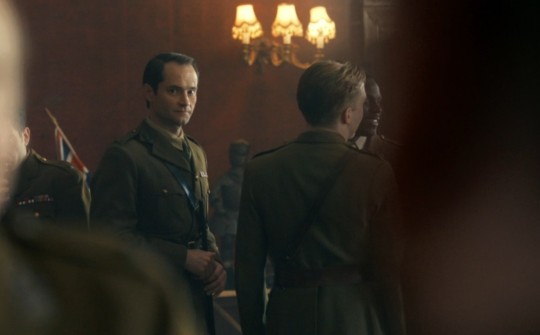
and starts to turn back towards his colleagues with this almost jealous/shooting daggers look.
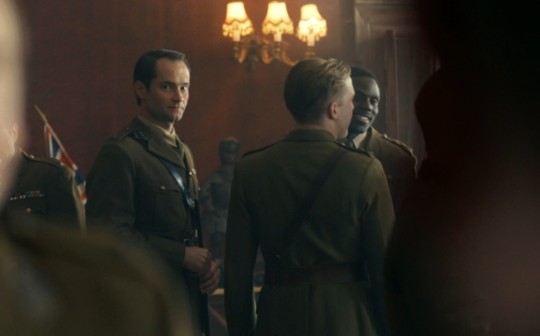
and then he makes the face on the left and looks so spaced out, a bit resigned, disappointed and hurt. And then he does his thing again like in Redding Weddy where he presses his lips together and forces a smile (this time tiny smile) with a tense jaw to regain control over his emotions, to put on a stiff upper lip. But look at his eyes the man is clearly hurt (heartbroken) about something
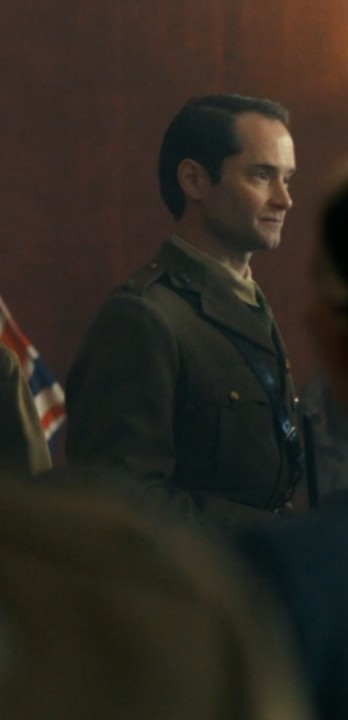
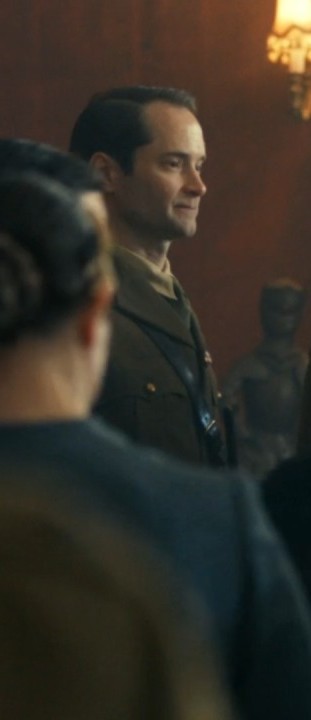
and at first I did not really get what was going on but then it clicked.
You ever had that moment when someone is waving to you that you don't know and you're like do they mean me? and you wave back but then realise they were waving at the person behind you? It's like that just with "in front" instead of "behind"
Because when Cap's eyes fall on Havers look who's standing in front of him in the Captain's line of sight
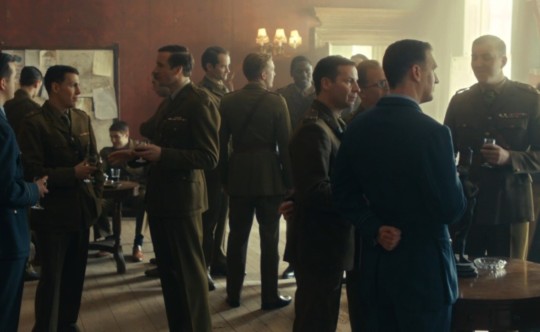
Yep it's fucking Cartwright. And when Havers has his little "I turn to you moment" Cartwright is also walking towards Cap in the frame
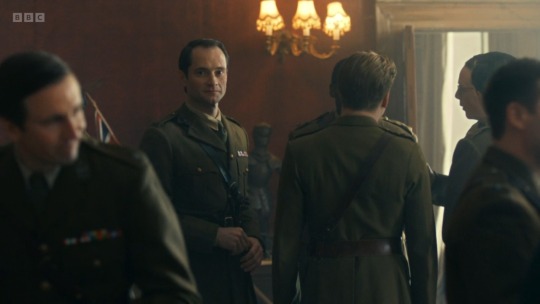
So from the camera angle and they way it's shot we see them bump into each other but do not see if Havers actually saw it ; what he definetely sees is them turning towards each other, though.
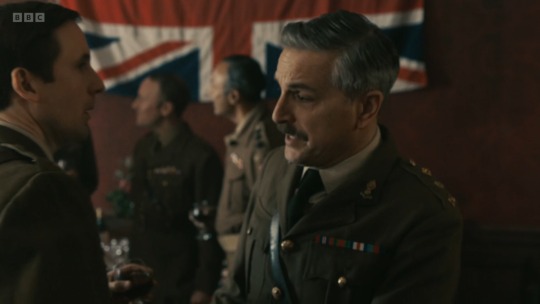
and in the next frame Cartwright takes a step to his right and we see them standing like this
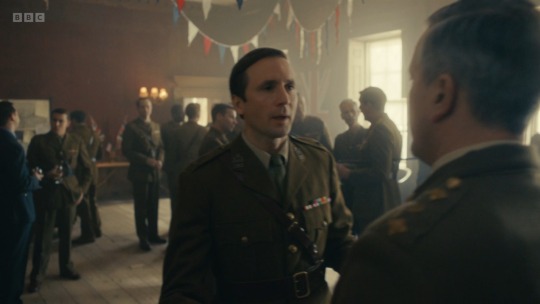
So it's a line and Havers is basically looking at Cartwright's back so when Cap lifts his finger to indicate that he wants to go over to Havers, it's probably not visible to Havers because
first of all we can't see Havers anymore in the background when the camera focuses on Cartwrights face. And secondly from the shot of Cap pointing it becomes apparent that Cartwright's body is blocking Havers's view of that.
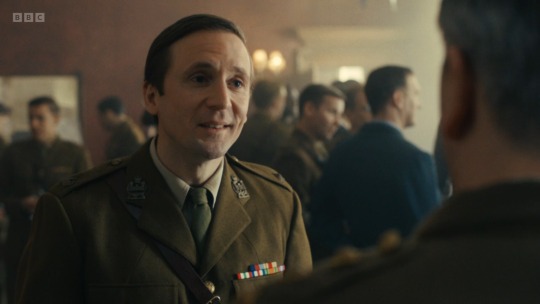
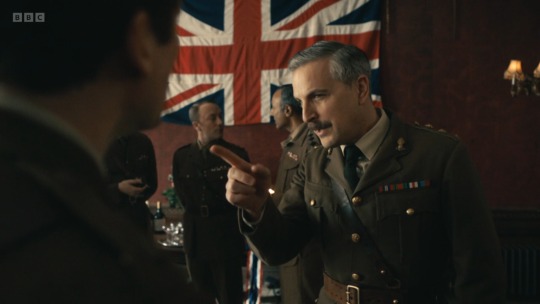
So but what am I actually getting at?
Well...
OMG I think Havers thought for a bit that Cap didn't want to reconnect with him (or wasn't there because of him) but with (because of) Cartwright!!
Because what he's seeing is Cap entering the room looking for someone, their eyes meet Cap takes a few steps staring happily in his direction. But then some guy walks to Cap in front of Havers who he realises is in Cap's direct line of sight. Then the two of them start talking and Cap looks so happy whilst talking to this other guy! And then we see Havers's heart break! And how he struggles to collect himself and hide that!
He probably thought Captain moved on, that he no longer has the same feelings for Havers, that maybe he has affections for Cartwright. Or at least that Cap prefers o talk to Cartwright instead of him.
So and then when Havers runs to his aid he turns to the next person, who happens to be Cartwright and yells "Well fetch a medic!", he sounds soooo angry. I can think of a few explanations here tbh from "why aren't you helping him?" to "what have you done to him?!" to "oh it's you I can't stand you since 5 minutes ago get out off my sight!" maybe it's neither, maybe its all of them or a mixture. Who knows.
However we're not finished here because guess what
When Cap says "I'm sorry I had to find you" this is Havers reaction.
He looks legitimately surprised in an "who, me?" kind of way (and /or his "omg is this happening now" kind of way just like back in RW) but also worried about Cap and his Adam's apple does the bobbing thing it does when he's nervous or emotional.
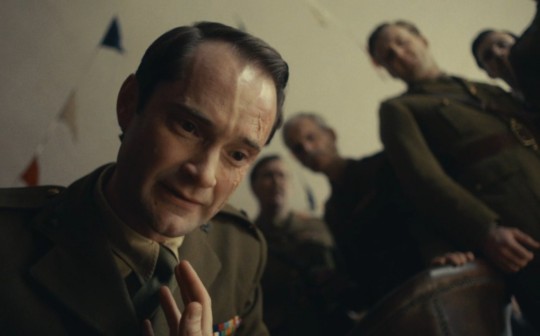
But then Cap's words seem to sink in and he's now clearly emotional. Not just worried but also look how softly he gazes as Cap and tries o smile at him whilst clearly being distraught.
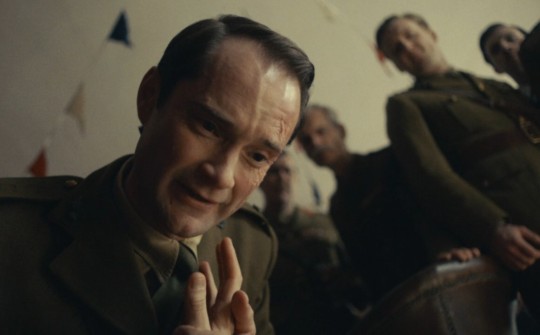
And then the realisation hits him about what exactly is happening right now. That Cap indeed was there because of him and that he is now dying in front of him and that there's probably not much time left. And that's even before Cap tries to confess his feelings and Havers confirms that he knows about them.
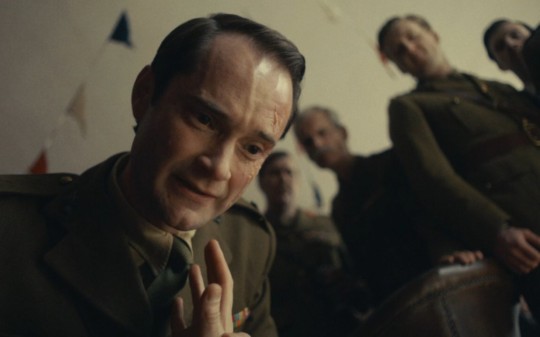
And it's all just so absolutely fucking heartbreaking.
PS:
Just realised that this would also explain why Havers didn't walk over to Cap and just interrupted the conversation with Cartwright or joined in. Because he thought that Cap was there because of/ wanted to talk to Cartwright and Anthony was heartbroken about that ;_;
Btw also a little thing that's interesting to note in this regard: before the older soldier walks over to C&C we can see Havers in the background just constantly looking at them from the distance. Maybe it's jealousy, maybe it's yearning, maybe it's both.
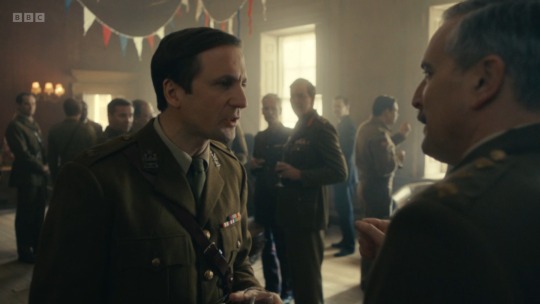
Yeah so that's that. Safe to say I as always have a lot of opinions and emotions about these two. Curious to know what you guys thought was going on there with Havers .
#bbc ghosts#bbc ghosts meta#the captain ghosts#the captain#captain x havers#bbc ghosts series 5#bbc ghosts series 5 spoilers#lieutenant havers#bbc ghosts spoilers#carpe diem#the captain and havers#major anthony havers#conversation with lovely people
433 notes
·
View notes
Text
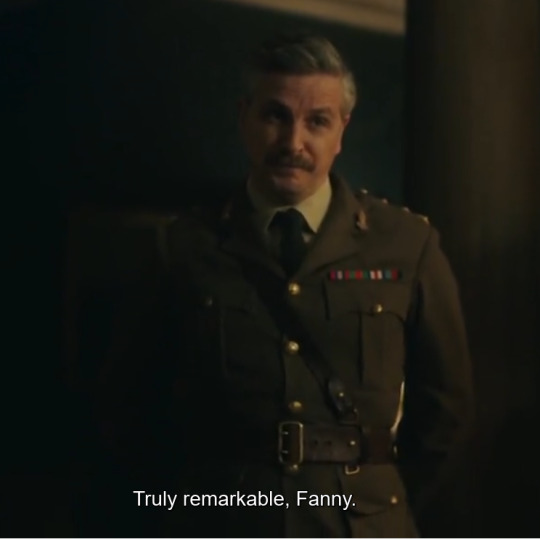
I just realised that, in light of the Christmas special, the Captain's proud praise to Fanny in Family becomes all the more meaningful!
When she was a girl, Stephanie wanted to be recognised as a smart woman who could help her family thanks to her wits and specific knowledge. She didn't get that in her life, as her parents forced her into thinking that she could only help through being a proper lady and getting married, however wrong the spouse and the entire role she would have to play felt to her. She forced herself to exist through this normative identity: the prim and proper Lady Button.
But in that moment, Fanny gets to save her found family with her smarts, showing all her talent at logic and deductions! She's the one piercing the story together thanks to the ghosts' observations - and how powerful it is that everyone has a role to play in this string of deductions and the subsequent saving!
She truly is the same girl underneath. And this time, she gets recognised for her wits! Most ghosts thank her very briefly before moving on quickly. But the Captain lingers over his praise a bit, with his proud eyes, the solemn tone of his voice, his choice of words... This is a high praise delivered in such a proud voice. It must have felt so meaningful to Fanny to be warmly congratulated on her reasoning skills!
And she does look like the cat who got the cream, aha!
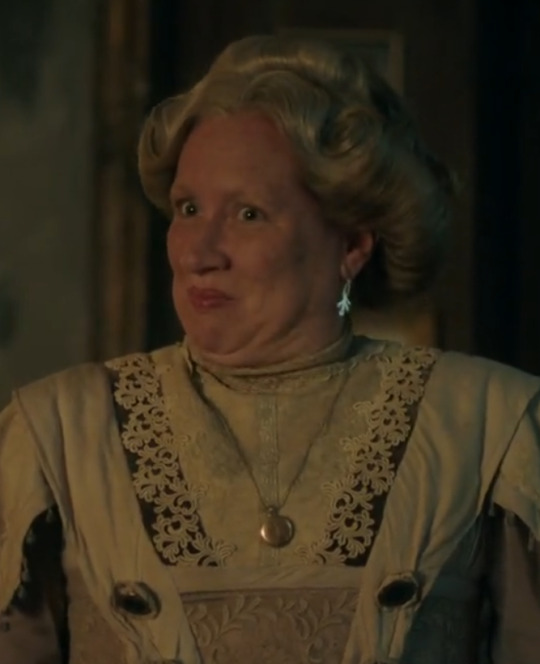
#bbc ghosts#ghosts bbc#bbc ghosts meta#fanny button#the captain#the captain ghosts#part of the family#family#s03e06#lady button#he came!#the Captain & Fanny#the repression siblings
148 notes
·
View notes
Text
"It’s the silence after the shot. One minute they’re cawing away happily and the next it’s just...feathers"
I adore this moment for so many reasons (the Captain opening up, especially to Kitty, gives me life!). The Captain may be a nerd for war technology and strategy, but the cost of it all gets to him emotionally. His profound emotion when he recounts this story is so meaningful... He is very much impacted by the trauma of the war.
Also, maybe it'll seem very far-fetched, but to me, "feathers" sounds a bit like "Havers"?
Knowing that Havers was a WWII soldier who left to serve on the active front, the potential association makes me very sad. I don't know if Havers did indeed get wounded/killed in action, but it seems obvious that the Captain would have wrestled with that idea. "One minute, he's cackling away happily, and the next, it's just... Havers(' body)". (Not thinking of the Captain's guilt too, like "he left me - I mean he left for the front" => would he believe that it would have been his fault in a way if Havers got killed as he left (because of) him?)
I'm getting myself sad because of the Captain again!
#bbc ghosts#ghosts bbc#the captain ghosts#the captain#william havers#captain x havers#bbc ghosts meta#ish#family#tw: death#tw; death mention#tw: war
42 notes
·
View notes
Text
Hi, French native here :)
Your analysis is absolutely true in a contemporary context... but back when Humphrey was alive, it would have made sense (and would have been expected!) for spouses to use "vous" when talking together. The "tu" would have been reserved for extremely private and intimate exchanges (and I'm certain that a lot of people in arranged nobility marriages back then would never have used the "tu"; it might have been considered disrespectful/shocking as well).
This formality between married people would stay in practice through centuries. Actually, there are some people around my grandparents' age (especially in the "higher classes" of society) who would use the "vous" with their partners, even at home. It would have been considered old-fashioned then, but it was not unheard of (I can think of examples of former presidents using the "vous" with their spouses, even in family archive videos. In these families, you would most likely use "vous" with the children as well). It was not a sign of a lack of sentiment, but of deep respect towards trusted family members. These persons might have used the "tu" in very special and private contexts (for example in bed, I guess), and it would have felt extremely special to hear the "tu" addressed to you (or in more aggressive contexts, I guess a "tu" used during a fight would have shown a lack respect towards the other person, as efficiently as a slap in the face).
That being said, today it's an almost extinct practice: most everyone uses the "tu" with their partners, because we consider that it's a close/intimate relationship between equals, and you don't need to show as much deference and formality as was the case in earlier eras.
A poor equivalent that might make sense, perhaps: think of the Victorian era and its sparse use of given names, even between intimate friends and sometimes spouses. Back then, first names were only uttered in very intimate and emotional situations, and definitely in private. Of course, it's not a perfect analogy, but it's close enough.
Anyway: in this context, it is not a sign of distance or cheapened sentiment through formality if Sophie addresses Humphrey with "vous". In that moment, she is having a private(ish) conversation with her husband, but she is in a social context: there are other people in the next room, and she's about to entertain a "book club". Anyone could hear them, they're not in the privacy of their own room. Back then, using the "tu" in that moment could have been seen as insulting. With the "vous", she is not only applying the formality that is due between respectable spouses, she is also showing her personal respect and appreciation for him.
If I remember correctly, it's the first time we hear her use the vous with him? In their very first interaction, even though he's in the same room, she's very dismissive: "what does he want now?!". She's not addressing him properly, even as a person with whom she's having an exchange. When she says "Je voulais vous remercier", it's a real statement that comes from the heart, and a mark of respect between trusted, respectable partners. Humphrey would have considered this "vous" as something very special indeed.*
The distinction between tu/vous is tricky to navigate, and its intricacies change through time. It's funny to think how relatively recent this normalisation of "tu" between married people is! In ancient letters, you can find the sweetest declarations of love with the formal "vous". The meanings behind tu/vous never fail to fascinate me ^^
*Now, in the context of the show, considering how sparse Humphrey's knowledge of French seems to be, how certain can we be that he understood the implications of Sophie's "vous"? I like to think that he did, aha! An English nobleman at that time certainly would have, but Humphrey isn't just anyone, is he? Maybe I should have written "He *should* consider this vous as something very special indeed"!
it's a very small detail but in the bone plot flashbacks sophie says to humphrey "je voulais vous remercier" (i wanted to thank you). this is sweet until you realise that she's using vous, the formal you. there's a lot of complexities in the tu/vous distinction in french, but i don't think it takes a genius to realise that your husband is probably not somebody you should be using vous for. in conclusion: she's considered their relationship a formal one for the last twenty years
36 notes
·
View notes
Text
Oh, fascinating! Yes!
Also... he doesn't exactly pin it to his medal bar, but just below, over his heart! The badge is distinctive for him both for its value and its emotional meaning. (He is so touched, my goodness... It is a proof that he is respected and honoured for being part of the team; he belongs. And it is something that he holds close to his heart.)
also my boyfriend @yespleasemary pointed something out to me that i can’t stop thinking about, and that’s that the captain is so touched at receiving the teamwork badge from pat because his own medals were pretty bog standard. not insignificant by any stretch, they still mean something, but he never earned anything really spectacular. he couldn’t get a service revolver, he couldn’t go on the front lines, he couldn’t give the full effort to the war that he wished he could. chances are, despite his work with the button house 11, the captain often felt largely useless.
so to have been bestowed with something that pat claims is a “very high honour” must have meant so very much to him, not to mention how it further signifies how he’s not their leader but a part of the team (i’m sure we remember the article that talked about how cap’s soldiers left him out of their christmas celebrations). no wonder he looks absolutely awed and speechless and immediately pretends to pin it to his medal bar.
#bbc ghosts#ghosts bbc#bbc ghosts series 3 spoilers#bbc ghosts series 3#bbc ghosts spoilers#bbc ghosts meta#ish#the captain ghosts#the captain#pat butcher#the woodworm men
202 notes
·
View notes
Text
Spoiler about s03e03, The Woodworm Men
It warms my heart to see the Captain look so moved when Patrick praised him and offered him the teamwork award... and he placed the imaginary badge over his heart!

Just below his medals, but he positions the badge apart from them, closer to his heart. This token holds a distinctive meaning, a more emotional one -it's also a sign that the Captain's identity is gradually shifting from his military persona to a wholesome human being.
This shift is shown in many way in series 3: the Captain learns that it's okay to make one's own decision rather than following orders (he doesn't fully implement in his own life yet), he's ready to reveal his name to Alison, about to open up in the therapy group... He also reveals himself through those who are important to him: he is a key part of the group and a father figure to Kitty, Mike and Alison. This teamwork award is so meaningful, as well as his obvious emotion and pride at receiving it and metaphorically pining it close to his heart.
#bbc ghosts#ghosts bbc#ghosts spoilers#bbc ghosts spoilers#bbc ghosts series 3 spoilers#the captain#the captain ghosts#bbc ghosts meta#ghosts meta#my meta#the woodworm men#ghosts series 3#the captain & kitty
115 notes
·
View notes
Text
Also, knowing that his name is linked to his orientation, I would find it satisfying that it's Kitty, his ersatz (German!) daughter who speaks his name (let's bear in mind that she knows it from when he was alive, probably), and that he gets to play with his name in the safe zone of theatre (you know, that art with actors "prancing about in loinclothes, topless, oiled up, kissing each other probably").
It would makes his panicky glance around after he calls her "Beatrice" all the more meaningful as well. Shifting it from a "is that... alright?" to "did they... catch anything amiss?".
Listen, whatever his name ends up being, I love this scene with all my heart!
Oh, I certainly do wish that the Captain's name gets to be Dick or another savorous pun (I can't wait for the reveal!)... but after Part of the Family, a part of me hopes that his name is Gerald!
#ghosts bbc#bbc ghosts headcanon#ghosts spoilers#bbc ghosts spoilers#bbc ghosts series 3 spoilers#the captain ghosts#kitty ghosts#bbc ghosts#silly posts#the captain's name#the captain's sexuality
45 notes
·
View notes
Text
Oh, I certainly do wish that the Captain's name gets to be Dick or another savorous pun (I can't wait for the reveal!)... but after Part of the Family, a part of me hopes that his name is Gerald!
#ghosts bbc#bbc ghosts#ghosts spoilers#bbc ghosts spoilers#bbc ghosts series 3 spoilers#bbc ghosts headcanon#the captain ghosts#bbc ghosts series 3#part of the family#silly posts#the captain's name
45 notes
·
View notes
Text
Regarding Julian's panic at Barclay staying in the house as a ghost => I know that it is obviously because the man is insufferable and would be a pain to spend eternity with... But I have a headcanon that Barclay probably has dirt on him and could potentially make his life difficult in the house, at least in the first years. I mean, Julian knew about his Fidji account... goodness knows what Barclay might have on him! Knowing how these men love blackmail, I think Julian would be wary of the skills he honed in death being used for at least the first few years of Barclay's stay. It might be why his panic is so over the top compared to the other ghosts.
#bbc ghosts#bbc ghosts headcanon#3x01#bbc ghosts series 3 spoilers#bbc ghosts spoilers#the bone plot#julian fawcett#ghosts spoilers
52 notes
·
View notes
Text
Bum & chips ?
Thinking about cooking something Ghosts-themed for tomorrow, but I can’t really come up with anything good. Might just buy a horrible frozen lasagna and a lot of wine like in Moonah Stone <3
75 notes
·
View notes
Text
Oh, it would be so delightful! I don't think Alison's family is ever mentioned in the show (... apart from ancient members of the Button family ^^), and it seems clear to me that she doesn't have any family left (or maybe is estranged from them?). I love how the show explores the theme of found family, both for the ghosts and Alison herself.
And yes, I totally agree: Alison and the Captain have such an extraordinary dynamic! I will say though, I do think they have these father/daughter interactions in Perfect Day. The Captain works closely with Alison to make sure the wedding is perfect, and it's utterly lovely! I remember at the beginning of the episode, when Alison reassures Clare and suggests they can organise the wedding at Button House, he looks at her approvingly and praises her "Very good!"... He looks so proud and thrilled, and it makes my heart melt! I adore how the Captain is portrayed in that episode, he looks so vibrant and free with himself... and he works amazingly well with Alison (when they organise the room "together", so heartwarming!).
I would definitely love to see more of these sweet interactions (or... you know, infuriating, because the Captain would totally be an infuriating father figure LOL)! Apparently there will be an episode which features the Captain and Kitty, and I'm excited to see this as well. I love the moment they share in Getting Out, when he calls her Katherine and offers a way to make Alison stay (you love Alison, don't you? You want her to stay?). He sounds so fatherly in it, and I'm sure these two could work wonderfully together.
Gnii, so exciting!
I’ve probably mentioned this before lol but I really want Alison and The Captain to have an episode where they’re like father and daughter. I love their friendship and I just love the character dynamic where one person is a reluctant parent figure who starts caring about someone they used to find annoying lol.
I don’t know if Allison’s family has been mentioned haven’t rewatched the show in ages but I presume at least one parent is gone (obviously the one on the Button’s side otherwise Alison wouldn’t have inherited the house they would) and there’s no mention as far as I’m aware to any other family because she spends Christmas with Mike’s family, so Alison seeing The Captain as a father figure (or maybe a brother figure) would be adorable.
#bbc ghosts#ghosts bbc#the captain#the captain ghosts#kitty ghosts#alison cooper#bbc ghosts headcanon#found family#the captain & alison#the captain & kitty
82 notes
·
View notes
Text
I don't know how realistic it is, but my first thought was that they might have been hosting a party - a respectable one! - at the time (which I find hilarious, because she is not on board with Alison's party in About Last Night).
That being said, it's probably more likely that she either followed her husband and caught him in flagrante delicto at that undue hour (which could mean that she says "George?" before falling because it's the thing she said when she saw the trio, and her husband decided to throw her out of the window right there and then?) , or she caught him, then wandered in shock/rage/what have you, before deciding to come back in the bedroom at 3, still dressed, and we know the rest.
(Although I have to admit, the thought of a proper Edwardian lady having to spend eternity in a nightgown or a more revealing type of nightwear makes me laugh! I'm happy for Fanny that she got to die in style.)
Why was Fanny fully dressed at 3 in the morning?
53 notes
·
View notes